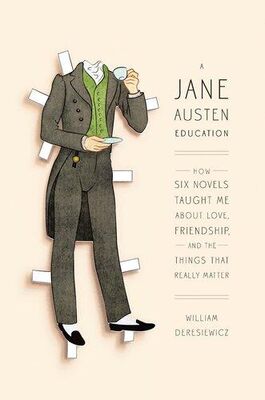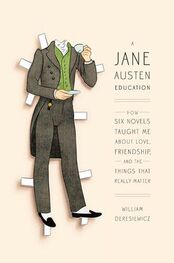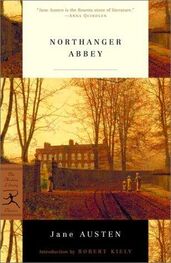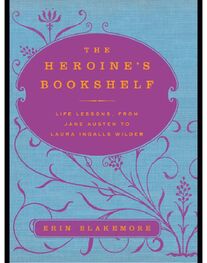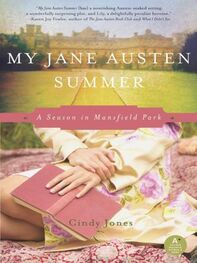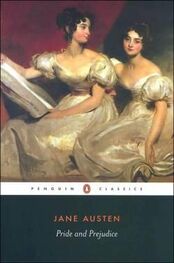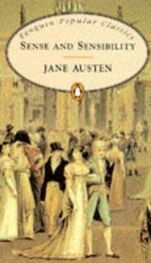None of this happens rationally, though, as if you drew up a checklist of pros and cons—another cinematic cliché—and toted up the sum. Elinor’s way, I recognized, is every bit as intuitive as Marianne’s, and, if anything, takes place at a deeper level. Not only does love not strike you in an instant, it turned out, it doesn’t even “strike” you at all. You never know the moment that you fall in love, in Austen’s vision; you only discover you already have. “Will you tell me how long you have loved him?” Elizabeth was asked near the end of Pride and Prejudice. “It has been coming on so gradually,” she replied, “that I hardly know when it began.” As for Elinor and Edward, I realized, we never even heard about it. At one point it was “like,” at another it was “love,” and Austen simply trusted us to understand that the first had slowly turned into the second.
So, I asked myself, what if Elinor and Edward had never met? What if she had “seen a great deal” of someone else? What if she had discovered that his mind was well informed, his observation just and correct, his taste delicate and pure? Would she have fallen in love with him, instead? Austen’s reply was brutally clear: of course she would have. There is no “one person” out there, Elinor’s creator was trying to tell us. Austen had no use, I saw, for things like fate or soul mates, second selves or other halves, guiding stars or Greek myths, or any other of the mystical ideas with which we try to turn love into something cosmic, something sacred, something more than what it is: a relationship dependent, at least in its inception, not on destiny but on its very opposite—chance.
And then, I realized, she went a terrible step further. Even once we fall in love, she said, it isn’t necessarily forever. Divorce was not a realistic possibility in Austen’s world, but death and disenchantment both were, and when they occurred, she thought, it was perfectly possible—even inevitable—to fall in love a second time. “He will rally again,” Anne Elliot believed of Captain Benwick in Persuasion, just lately bereaved of his fiancée, “and be happy with another.” Benwick himself did not believe it, but so it proved to be, and faster than even Anne had imagined. As for Marianne, instead of dying for love, as she first expected, or withdrawing from the world, as she later planned, she lived to form the thing that had not been dreamt of in her philosophy, a second attachment.
“The cure of unconquerable passions, and the transfer of unchanging attachments,” wrote the grandmother of romance fiction, the author who launched a score of sappy movies and a hundred sentimental sequels, “must vary much as to time in different people.” No passions, in other words, are unconquerable, no attachments exist that can’t be transferred. Our hearts can change, just like our minds. Austen believed in love, I saw; she just did not believe in it the way we want her to.
None of this was merely theoretical for her. Austen was called upon to give some real-life romantic advice at a certain point, and she put her money where her mouth was. When Fanny Knight, her favorite niece, was twenty-one, she was trying to decide whether to marry a local young gentleman, John Plumptre. The young lady had her doubts. He seemed a little stiff, a little too religious and moralistic, and in any case, she wasn’t sure that she loved him enough. So in the course of two long exchanges, she hashed it all out with her wise Aunt Jane.
The correspondence was top secret: Fanny concealed the first letter in a package of sheet music, and even Austen’s sister, Cassandra, was not allowed to be in on it. “I do not know how I could have accounted for the parcel otherwise,” Austen said approvingly, “for tho’ your dear Papa most conscientiously hunted about till he found me alone in the Dining-parlor, Your Aunt C. had seen that he had a parcel to deliver.—As it was however, I do not think anything was suspected.” The second letter, though, began to make her sweat. “I shall be most glad to hear from you again my dearest Fanny,” she said, “but . . . write something that may do to be read”—that is, read aloud—“or told.”
Austen examined the letters, as may be imagined, with keen attention. “I read yours through the very evening I received it,” she replied, “getting away by myself—I could not bear to leave off, when once I had begun.” This was no mean trick in such a tight-knit household, with three other women—Cassandra, their mother, and Austen’s best friend, Martha Lloyd—breathing down her neck. “Luckily,” she explained, “Your Aunt C. dined at the other house, therefore I had not to manoeuvre away from her ;—& as to anybody else, I do not care.”
Austen’s response to her niece’s dilemma, however, was more ambivalent. “My dearest Fanny,” she interrupted herself at one point, “I am writing what will not be of the smallest use to you. I am feeling differently every moment, & shall not be able to suggest a single thing that can assist your Mind.” Fanny quite plainly felt otherwise, though, and in talking out the arguments on both sides of the question, Austen not only helped her niece reach a decision, she affirmed the romantic beliefs that her own novels expressed. What she urged on her readers was good enough for her own flesh and blood.
The problem was this. On the one hand, Mr. Plumptre was clearly a very worthy young man. On the other, Fanny’s affection for him, as Austen saw, was already on the decline. But as she consoled her niece, by reflecting on the young man’s qualities, for having made the mistake of thinking herself in love in the first place, Austen’s mind began to change once more:
Oh! my dear Fanny, the more I write about him, the warmer my feelings become, the more strongly I feel the sterling worth of such a young Man & the desirableness of your growing in love with him again. I recommend this most thoroughly.—There are such beings in the World perhaps, one in a Thousand, as the Creature You & I should think perfection, where Grace & Spirit are united to Worth, where the Manners are equal to the Heart & Understanding, but such a person may not come in your way.
In choosing a mate, she was telling her niece, the most important thing is character. Grace and spirit and manners—the kinds of qualities that attracted Marianne to Willoughby—are wonderful to have, but they are no substitute for the Edwardlike attributes of worth and heart and understanding. All of Austen’s heroes had the second; only a couple were also blessed with the first.
Yet talking Fanny into the match was the last thing that Austen wanted to do. “You frighten me out of my Wits,” she said at one point. “Your affection gives me the highest pleasure, but indeed you must not let anything depend on my opinion. Your feelings & none but your own, should determine such an important point.” Feelings, not arguments. You shouldn’t marry someone because of his character; you should marry him because of the emotions that his character inspires. “Anything is to be preferred or endured rather than marrying without Affection,” Austen reminded her niece, “and nothing can be compared to the misery of being bound without Love.”
Still, feelings can change, and we can do something about it. “The desirableness of your growing in love with him again”: it sounded like Austen were asking her niece to perform the impossible. Surely you can no more choose to grow in love than you can decide to grow taller. Yet Austen believed that if a person’s character is good, love increases with simple familiarity. She said “grow,” not “fall”—a gradual, organic process, not a bolt from the blue. “I should not be afraid of your marrying him,” she explained; “with all his Worth, you would soon love him enough for the happiness of both.”
Читать дальше